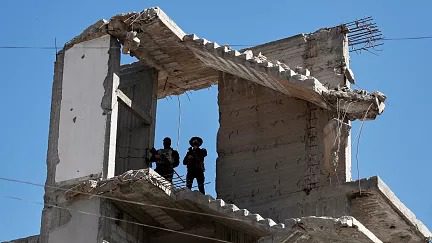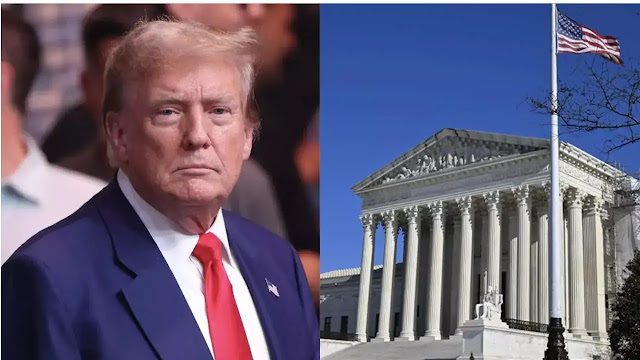The Syrian government has issued a strong condemnation of an Israeli drone strike that killed six soldiers near the capital, Damascus, on Tuesday, August 26, 2025. The attack, described by the Syrian Foreign Ministry as a “serious violation of international law” and a “breach of the country’s sovereignty,” has heightened tensions between the two nations, which have been in a state of war since 1948. The strike, part of a pattern of Israeli military actions in Syria, has raised concerns about the fragile security situation in the region, particularly in the wake of recent political changes following the ouster of long-time Syrian ruler Bashar al-Assad in early December 2024.
According to the Syrian Observatory for Human Rights (SOHR), the Israeli operation involved two separate drone strikes in the Damascus countryside. The first targeted a military site, while the second struck rescue workers who had rushed to the scene to assist the wounded, exacerbating the human toll. The Israeli military, consistent with its policy of neither confirming nor denying specific operations in Syria, has yet to issue an official statement on the incident. The attack comes just days after rare direct talks between Israel and Syria in Paris, mediated by the United States, raising questions about the prospects for de-escalation and a potential security agreement.
The Syrian Foreign Ministry’s statement framed the strike as part of “repeated aggressive policies by the Israeli occupation aimed at undermining security and stability in the region.” The incident underscores the ongoing volatility in Syria, where internal political upheaval and external interventions continue to shape a complex and precarious security landscape. As the international community watches closely, the strike highlights the challenges of achieving lasting peace in a region marked by decades of conflict and mistrust.
Historical Context of Syria-Israel Relations
The tensions between Syria and Israel are rooted in a long history of conflict, beginning with the establishment of the State of Israel in 1948. The two nations have been technically at war since the Arab-Israeli War of that year, which resulted in Israel’s victory and the displacement of hundreds of thousands of Palestinians. The 1967 Six-Day War further escalated tensions, when Israel captured the Golan Heights, a strategically significant plateau in southwestern Syria. Israel’s subsequent annexation of the Golan Heights in 1981, which Syria and much of the international community consider illegal, remains a major point of contention.
Over the decades, Syria and Israel have engaged in intermittent clashes, with the Golan Heights serving as a flashpoint. The 1973 Yom Kippur War, in which Syria and Egypt launched a surprise attack to reclaim territories lost in 1967, was a significant escalation, though it ended with a ceasefire and the establishment of a United Nations-monitored buffer zone in the Golan. Despite periods of relative calm, the two countries have never signed a peace treaty, and their relations remain defined by mutual distrust and sporadic hostilities.
Since the outbreak of the Syrian Civil War in 2011, Israel has conducted hundreds of airstrikes and drone operations in Syria, primarily targeting Iranian-backed militias, Hezbollah, and Syrian military assets. Israel has justified these strikes as necessary to prevent the transfer of advanced weapons to Hezbollah, a Lebanese militant group allied with Syria and Iran, and to counter Iran’s growing influence in the region. The ouster of Bashar al-Assad in December 2024, following a rapid offensive by opposition forces, has introduced new uncertainties, with Israel intensifying its military operations to secure its borders and monitor the evolving political landscape in Syria.
Details of the Drone Strike
The drone strike on August 26, 2025, targeted a military site near Damascus, according to the Syrian Observatory for Human Rights, a UK-based monitoring group with a network of sources inside Syria. The first strike hit a facility believed to be associated with Syrian military operations, killing several soldiers and causing significant damage. As rescue workers, including medical personnel and security forces, arrived to assist the victims, a second strike targeted the responders, killing additional personnel and exacerbating the tragedy. The SOHR reported a total of six fatalities, though the exact number of casualties and the extent of the damage remain subject to verification.
The Syrian Foreign Ministry condemned the attack as a deliberate act of aggression, accusing Israel of targeting not only military personnel but also civilians involved in rescue efforts. The ministry’s statement described the strike as a “heinous crime” and called on the international community to hold Israel accountable for violating Syria’s sovereignty and international humanitarian law. The use of a second strike to target rescue workers, if confirmed, could constitute a violation of the Geneva Conventions, which protect civilians and humanitarian personnel in conflict zones.
Israel’s silence on the incident is consistent with its long-standing policy of ambiguity regarding military operations in Syria. This approach allows Israel to maintain strategic flexibility while avoiding direct escalation with Syria or its allies, including Iran and Russia. However, the timing of the strike—just days after U.S.-mediated talks in Paris—has raised speculation about Israel’s intentions and the potential impact on nascent diplomatic efforts.
Regional and International Implications
The drone strike comes at a critical juncture in Syria’s political transition, following the ouster of Bashar al-Assad in December 2024. The fall of the Assad regime, which had ruled Syria for over five decades, has created a power vacuum, with various factions vying for influence and control. The transitional government, backed by opposition groups and supported by regional powers such as Turkey, faces the daunting task of stabilizing the country, rebuilding infrastructure, and addressing the needs of millions of displaced Syrians. Israel’s military actions, while aimed at securing its own interests, risk complicating these efforts by fueling resentment and undermining the fragile transition process.
The strike also has broader implications for the region, where tensions between Israel and Iran-backed groups remain a major driver of instability. Iran, a key ally of the former Assad regime, has maintained a significant presence in Syria through its support for Hezbollah and other militias. Israel’s frequent strikes in Syria are designed to disrupt this presence, but they also risk provoking retaliation from Iran or its proxies, potentially escalating into a wider regional conflict. The involvement of Russia, another key player in Syria, adds further complexity, as Moscow has historically supported the Syrian government while maintaining diplomatic ties with Israel.
The recent talks in Paris, mediated by the United States, were seen as a rare opportunity to reduce tensions between Israel and Syria. The discussions, which reportedly focused on border security, the status of the Golan Heights, and the presence of Iranian-backed forces, raised hopes of a potential security agreement that could stabilize the region. However, the drone strike threatens to undermine these efforts, signaling that Israel remains wary of the new Syrian leadership and is prepared to act unilaterally to protect its interests.
Syria’s Response and International Law
The Syrian Foreign Ministry’s condemnation of the strike reflects the country’s frustration with Israel’s repeated military interventions. By framing the attack as a violation of international law, Syria is appealing to the international community to take action, though the prospects of meaningful accountability are limited. The United Nations Security Council, which has the authority to address violations of sovereignty, is often paralyzed by divisions among its permanent members, particularly the United States, Russia, and China. The U.S., a close ally of Israel, is unlikely to support measures that condemn Israeli actions, while Russia and China have historically backed Syria’s position.
The strike’s targeting of rescue workers, if verified, could constitute a war crime under international humanitarian law, which prohibits attacks on civilians and those providing humanitarian assistance. The Syrian government is likely to raise this issue in international forums, such as the UN General Assembly or the Human Rights Council, to garner support and pressure Israel. However, without concrete evidence and international consensus, such efforts are unlikely to result in significant consequences for Israel.
The Broader Context of Israeli Strikes in Syria
Since the ouster of Assad, Israel has intensified its military operations in Syria, conducting multiple airstrikes and drone attacks targeting military infrastructure, weapons depots, and personnel associated with Iran and Hezbollah. These operations reflect Israel’s strategic objective of preventing the emergence of a hostile government in Syria that could threaten its security. The fall of Assad has introduced new uncertainties, as the transitional government’s stance on Israel, Iran, and regional alliances remains unclear.
Israel’s actions are also driven by concerns about the proliferation of advanced weapons, including missiles and drones, that could be used by Hezbollah or other groups against Israeli targets. The Golan Heights, which serves as a buffer zone between Israel and Syria, is a particular focus of concern, as any instability in Syria could spill over into this sensitive area. Israel’s frequent strikes are intended to send a message to both the new Syrian leadership and its regional allies that it will not tolerate threats to its security.
The timing of the latest strike, however, raises questions about Israel’s broader strategy. The Paris talks suggested a willingness to engage diplomatically, but the attack may indicate a lack of confidence in the transitional government’s ability to control Iranian-backed forces or secure the border. Alternatively, the strike could be a calculated move to assert dominance and deter potential adversaries during a period of uncertainty.
Challenges to De-escalation and Peacebuilding
The drone strike underscores the challenges of achieving de-escalation and lasting peace in the region. The Syria-Israel conflict is deeply entrenched, with both sides holding firm to their positions on key issues such as the Golan Heights and the presence of foreign forces. The transitional government in Syria faces the dual challenge of consolidating power domestically while navigating complex regional dynamics involving Israel, Iran, Turkey, and Russia.
The U.S.-mediated talks in Paris were a step toward dialogue, but their success depends on mutual trust and a willingness to compromise—qualities that have been in short supply in Syria-Israel relations. The drone strike risks derailing these efforts, as it reinforces Syria’s narrative of Israeli aggression and could harden the transitional government’s stance. For Israel, the strike reflects a preference for preemptive action over reliance on diplomatic assurances, particularly in the absence of a stable and predictable government in Damascus.
The international community has a critical role to play in supporting de-escalation efforts. The United States, as a mediator, could leverage its influence to encourage restraint and facilitate further dialogue. Regional powers, such as Turkey and Saudi Arabia, which have supported the Syrian opposition, could also play a role in promoting stability by engaging with the transitional government and advocating for peaceful resolutions to conflicts with Israel.
The Humanitarian and Regional Impact
The drone strike has immediate humanitarian consequences, with the loss of six Syrian soldiers adding to the toll of violence in the country. The targeting of rescue workers is particularly concerning, as it undermines efforts to provide aid and support to those affected by conflict. Syria’s already strained healthcare system, decimated by years of war, struggles to respond to such incidents, leaving families and communities in grief and uncertainty.
The broader regional impact of the strike is equally significant. Continued Israeli military actions in Syria risk escalating tensions with Iran and Hezbollah, potentially drawing other actors into the conflict. The presence of Russian forces in Syria, which operate air defense systems and maintain a military presence, adds another layer of complexity, as any miscalculation could lead to unintended confrontations.
For the Syrian people, the strike is a reminder of the ongoing insecurity that has defined their lives for over a decade. The fall of Assad brought hope for a new chapter, but the persistence of external interventions and internal divisions threatens to prolong the country’s suffering. The transitional government must balance the need for security and sovereignty with the imperative to rebuild and address the needs of millions of displaced Syrians.
A Call for Accountability and Dialogue
The Syrian government’s condemnation of the drone strike is a call for accountability, but achieving justice in the context of international law is challenging. The UN and other multilateral institutions could play a role in investigating the incident and ensuring that violations of humanitarian law are addressed. However, the polarized nature of global politics makes consensus on such issues difficult.
More broadly, the strike highlights the urgent need for dialogue and de-escalation. The Paris talks, while a positive step, must be followed by sustained diplomatic efforts to address the root causes of the Syria-Israel conflict. Confidence-building measures, such as agreements on border security and the withdrawal of foreign forces, could pave the way for a more stable relationship between the two nations.
The international community, including the UN, the U.S., and regional powers, must work together to support Syria’s transitional government and encourage Israel to exercise restraint. By fostering an environment of dialogue and cooperation, stakeholders can help prevent further escalation and create conditions for lasting peace in the region.







